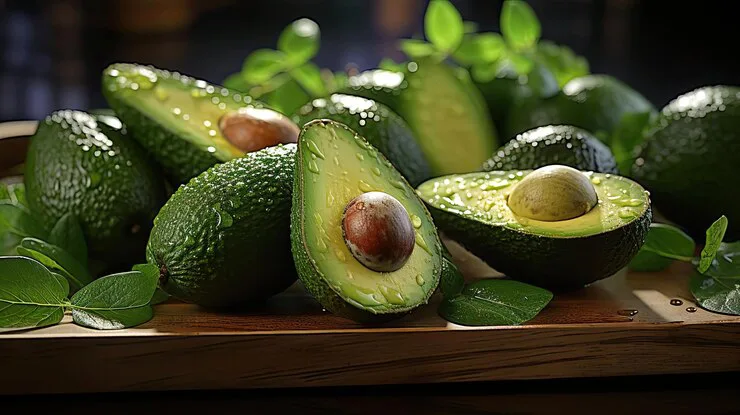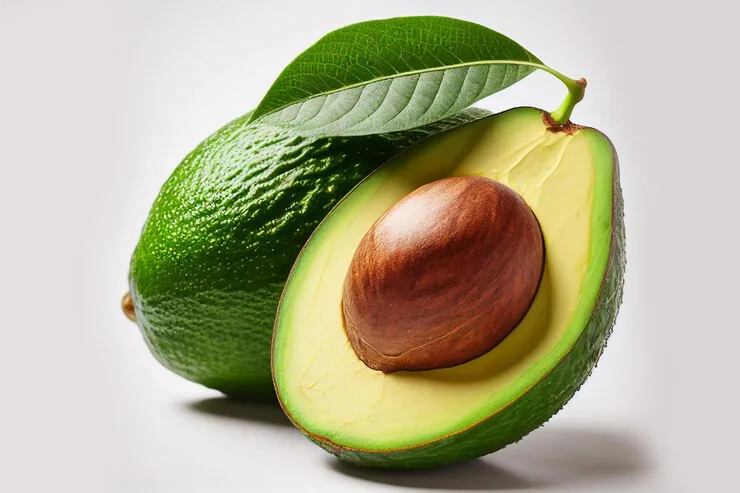Avocados, or Persea americana as it is formally named, is a special fruit indigenous to Central and South America. Belongs to the Lauraceae family, which also includes bay laurels and cinnamon. Avocados are prized for their creamy texture, mild flavor, and versatility in culinary applications. Here’s a closer look at this remarkable fruit:

Table of Contents
Avocados Appearances and Varieties:
Avocados come in various shapes, sizes, and colors, ranging from pear-shaped to round, and green to dark purple or nearly black when ripe. The most common variety is the Hass avocado, known for its rough, pebbly skin and rich, buttery flesh. Other popular types include Reed, Fuerte, and Bacon avocados, each with its distinctive flavor profile and texture.
Nutritional Profile:
They are often referred to as a nutrient powerhouse due to their rich array of vitamins, minerals, healthy fats, and phytochemicals. They are particularly notable for their high content of monounsaturated fats, primarily oleic acid, which is beneficial for heart health. Avocados also provide essential nutrients such as potassium, vitamin K, folate, vitamin C, vitamin E, and various B vitamins.
Culinary Uses:
They are incredibly versatile in the kitchen and can be enjoyed in both savory and sweet dishes. They are commonly used to make guacamole, a popular Mexican dip made by mashing ripe avocados with lime juice, onions, tomatoes, and seasonings. Avocado slices or cubes add creaminess and flavor to salads, sandwiches, wraps, and sushi rolls. Avocado can also be blended into smoothies, used as a topping for toast, or incorporated into desserts like puddings and ice creams.
Ripening and Storage:
Avocados ripen after harvesting and should be stored at room temperature until they reach the desired level of ripeness. To speed up ripening, you can place avocados in a paper bag with a ripe banana or apple, which releases ethylene gas, a natural ripening agent. Once ripe, avocados can be stored in the refrigerator to slow down the ripening process and extend their shelf life.
Sustainability and Environmental Impact:
Its cultivation has faced scrutiny regarding its environmental impact, particularly in regions where avocado production has led to deforestation and water scarcity. Sustainable farming practices, such as agroforestry and water-efficient irrigation techniques, are being implemented to mitigate these concerns. Additionally, supporting certified organic and fair-trade avocado producers can promote more environmentally and socially responsible avocado cultivation practices.
Benefits of Avocado Fruit:
They are renowned for their numerous health benefits, making them a popular choice for those seeking to improve their diet. Here are some potential health benefits associated with consuming avocados:

- Nutrient-Rich: Avocados are packed with essential nutrients such as vitamins C, E, K, and B-6, as well as riboflavin, niacin, folate, magnesium, potassium, and antioxidants like lutein and beta-carotene. These nutrients play vital roles in various bodily functions, including immune health, vision, and cardiovascular health.
- Heart health: They are rich in monounsaturated fats, particularly oleic acid, which is known to be beneficial for heart health. Consuming foods high in monounsaturated fats may help reduce levels of bad cholesterol (LDL) and increase levels of good cholesterol (HDL), thus lowering the risk of heart disease.
- Weight Management: Avocado may help with weight management even though they are high in calories.
Their high fiber content promotes feelings of fullness, which can help control appetite and reduce overall calorie intake. Additionally, the monounsaturated fats in avocados are metabolized differently than saturated fats, potentially supporting weight loss efforts.
- Blood Sugar Regulation: Because avocados have a low glycemic index, their effect on blood sugar levels is negligible. Their high fiber and healthy fat content may also contribute to improved blood sugar control, making them a suitable option for individuals with diabetes or those aiming to prevent insulin resistance.
- Eye Health: The antioxidants lutein and zeaxanthin found in avocados are beneficial for eye health. These compounds may help reduce the risk of age-related macular degeneration and cataracts by protecting the eyes from harmful ultraviolet radiation and oxidative damage.
- Digestive Health: Avocados are an excellent source of dietary fiber, which is essential for maintaining a healthy digestive system. Fiber promotes regular bowel movements, prevents constipation, and supports the growth of beneficial gut bacteria, which are crucial for overall gut health.
- Skin and Hair Health: The vitamins and antioxidants present in avocados can contribute to healthy skin and hair. Vitamin E, in particular, is known for its moisturizing and anti-aging properties, while vitamin C promotes collagen production, aiding in skin elasticity and wound healing.
- Anti-inflammatory Properties: Avocados contain various compounds, such as phytosterols and polyhydroxylated fatty alcohols, which exhibit anti-inflammatory properties. Incorporating avocados into the diet may help reduce inflammation in the body, potentially lowering the risk of chronic diseases like arthritis and heart disease.
You May Also Like: Pomegranate (Anar) Benefits and Side Effects
Overall, including avocados as part of a balanced diet can provide numerous health benefits, thanks to their rich nutrient profile and various bioactive compounds. However, it’s essential to consume them in moderation, as they are calorie-dense, especially for individuals watching their calorie intake.
The Bottom Line:
Avocados are nutritious and versatile fruits, rich in healthy fats and various vitamins. They offer benefits for heart health, weight management, blood sugar regulation, eye and digestive health, and possess anti-inflammatory properties. However, their cultivation can have environmental impacts emphasizing the importance of supporting sustainable farming practices.
